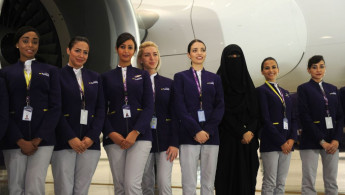Saudi airline hails first flight with all-female crew
A Saudi airline completed the country's first flight with an all-female crew on Thursday, the Saudi civil aviation authority announced on Saturday, framing the flight as a milestone for women's empowerment in the conservative kingdom.
Flyadeal, a budget subsidiary of the national company Saudia, operated the flight from the Saudi capital Riyadh to the Red Sea coastal city of Jeddah. Most of the seven-member crew including the first officer were Saudi women, flyadeal spokesman Emad Iskandarani said. The captain was a foreign woman.
Saudi Arabia is trying to expand its aviation sector and develop into a global travel hub, mimicking the success of its Gulf neighbours - Qatar and the Emirates - whose flag carriers are heavyweights in the global aviation industry. The kingdom aims to triple annual traffic to 330 million passengers and draw $100 billion in investments to the sector by 2030, to establish a new national flag carrier and build a new "mega airport" in Riyadh.
But the conservative reputation of the kingdom, long known for restricting women's ability to work and travel, could stand in the way.
In recent years, Saudi Arabia's civil aviation authority touted expanding roles for women in the aviation sector. In 2019, the authority announced the first flight with a female Saudi co-pilot.
Job opportunities for Saudi women had until recently been limited to roles such as teachers and medical workers, as they had to observe strict gender segregation rules. But a trend of reforms led by the de facto ruler, Crown Prince Mohammed bin Salman, has seen female participation in the workforce nearly double in the last five years to 33 percent.
Still, the proportion of women working in the kingdom was around half that of men in the third quarter of last year, at 34.1 percent, and female unemployment was well over three times higher than for men, at 21.9 percent.
Other reforms included lifting a decades-long ban on women driving and the easing of so-called "guardianship" rules that give men arbitrary authority over female relatives.
However, Saudi Arabia remains one of the world's most repressive countries for women's and human's rights activists. Reforms have coincided with a crackdown on dissent that has ensnared some of the very women pushing for such changes.





 Follow the Middle East's top stories in English at The New Arab on Google News
Follow the Middle East's top stories in English at The New Arab on Google News


